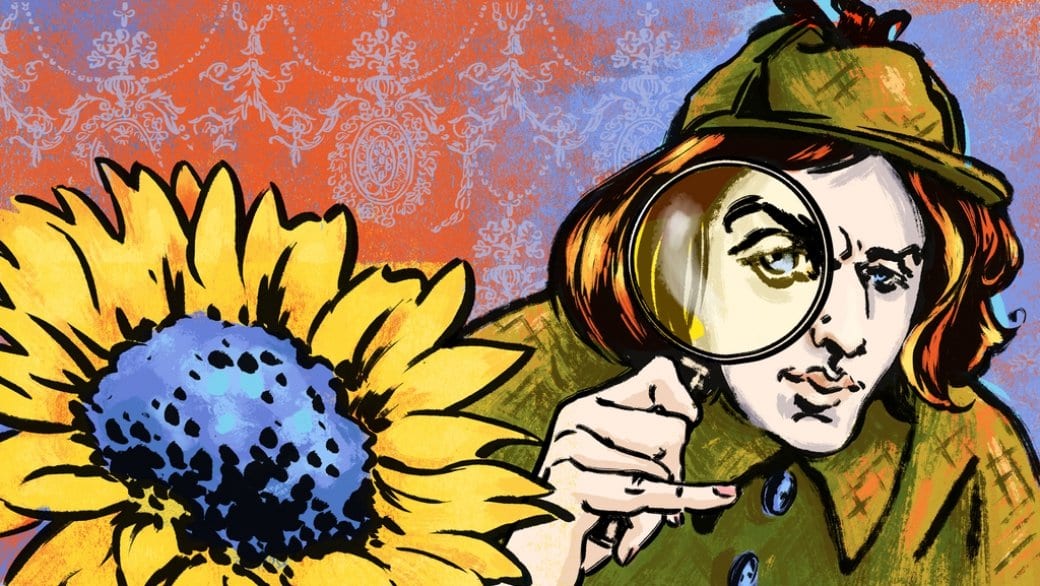In August 1889, fresh from the modest success of his 1887 debut consulting detective story, A Study in Scarlet, which featured the fictional private detective Sherlock Holmes, Doyle was invited to a dinner party with Oscar Wilde and John Marshall Stoddart, managing editor of Lippincott’s Monthly Magazine. During this dinner, Stoddart convinced Doyle to write his second book, The Sign of Four, which also included the character of Sherlock Holmes. Wilde also agreed to write a novel for the magazine — The Picture of Dorian Gray. Both were published in 1890.
Sherlock Holmes is one of the most well-known fictional detectives, with Guinness World Records listing him as the most portrayed literary human character in TV and film history. Doyle wrote 56 short stories and four novels featuring Holmes, who was so popular that many people thought his character was actually real.
Holmes’ powers of deduction may have been inspired by real-life surgeon Dr Joseph Bell of the University of Edinburgh Infirmary, whom Doyle had once served as an outpatient clerk, but it’s not a huge leap to say Doyle borrowed Holmes’ aestheticism from Oscar Wilde.
Sherlock Holmes, after all, is one of a long line of aesthetic, homosexual detectives. Doyle drew inspiration from Edgar Allan Poe’s private eye, C Auguste Dupin, introduced in The Murders in the Rue Morgue in 1841. Historian Graham Robb details the encoded homosexuality of Dupin in Strangers: Homosexual Love in the 19th Century.
We learn that “a variety of untoward events” have reduced Dupin to poverty, and he now only goes out at night. The narrator of The Murders in the Rue Morgue meets Dupin in an “obscure library” and writes how he.“felt my soul enkindled within me by the wild fervour, and the vivid freshness of his imagination. Seeking in Paris the objects I then sought, I felt that the society of such a man would be to see a treasure beyond price; and this feeling I frankly confided to him. It was at length arranged that we should live together during my stay in the city.”
Having listed the signifiers for Dupin, Robb soon turns his sights on the Baker Street detective.
Robb’s signifiers for Holmes are quite extensive. In The Adventure of the Greek Interpreter, Holmes claims to be related to Arabic Orientalist Horace Vernet, and tells his friend, Dr Watson, that “Art in the blood is liable to take the strangest forms.”
In Doyle’s first short story A Scandal in Bohemia, Watson observes that Holmes “was, I take it, the most perfect reasoning and observing machine that the world has seen, but as a lover he would have placed himself in a false position. He never spoke of the softer passions, save with a gibe and a sneer.” The softer passion being those for women. In fact, the only woman to whom Holmes shows any respect is Irene Adler, the antagonist of Bohemia, something of a female analog of himself who, like Holmes, cross-dresses as the need arises.
Holmes also regularly attempts to dissuade dear Watson from “the softer passions” to keep their little crime-solving household together. They take a break when Watson marries Mary Marston from The Sign of Four, but Watson returns to 211B Baker St, Holmes’ home, after her death.
Robb also picks out a telling scene, when Watson is shot in The Adventure of the Three Garridebs:
Then my friend’s wiry arms were round me, and he was leading me to a chair.
‘You’re not hurt, Watson? For God’s sake, say that you are not hurt!’
It was worth a wound—it was worth many wounds—to know the depth of loyalty and love which lay behind that cold mask. The clear, hard eyes were dimmed for a moment, and the firm lips were shaking. For the one and only time I caught a glimpse of a great heart as well as of a great brain. All my years of humble but single-minded service culminated in that moment of revelation.
That’s a revelation of love straight out of the gayest movie moment, if I ever did read one.
Lastly, in the 1901 The Hound of the Baskervilles, Robb notes that Holmes adopts Cartwright, the 14-year-old telegraph boy as his valet, “which was hardly an innocent act after the Cleveland Street scandal,” in which the government was accused of covering up the discovery of a male brothel patronized by aristocrats and other important people.
When Watson returns to 211B in The Adventure of the Mazarin Stone, he glances about the apartment. “Finally, his eyes came round to the fresh and smiling face of Billy, the young but very wise and tactful page, who had helped a little to fill up the gap of loneliness and isolation which surrounded the saturnine figure of the great detective.”
Doyle may not have realized he was hitting all these homosexual signifiers, but he built on Poe’s foundation of the homosexual detective: an intellectual, urban aesthete, with a taste for exotic, eccentric decoration, indulging in cocaine to take the edge off and a predilection for male company, who stalks the seedy underbelly of London solving crimes.
Doyle’s own take on homosexuality was based on a medical standpoint, not criminal. In 1924, he wrote on the trials of Oscar Wilde: “I thought at the time, and still think, that the monstrous development which ruined him was pathological, and that a hospital rather than a police court was the place for its consideration” — not an unusual attitude for a medical professional to take.
I love to imagine queer men picking up the Sherlock Holmes omnibus, enjoying the lovely domesticity and great adventures of the Baker Street bachelors, homosexual subtext and all. I also like to think that both Poe and Wilde left their stamp on the consulting detective — even a description of Holmes’ physical characteristics could be substituted for the great dandy. Also like Wilde, Holmes is great for snappy one-liners. As Holmes says, “The world is full of obvious things which nobody by any chance ever observes.”
History Boys appears on Daily Xtra on the first and third Tuesday of every month. You can also follow them on Facebook.
Legacy: February 22, 2017 11:03 amAn earlier version incorrectly spelled Edgar Allan Poe’s name.


 Why you can trust Xtra
Why you can trust Xtra


